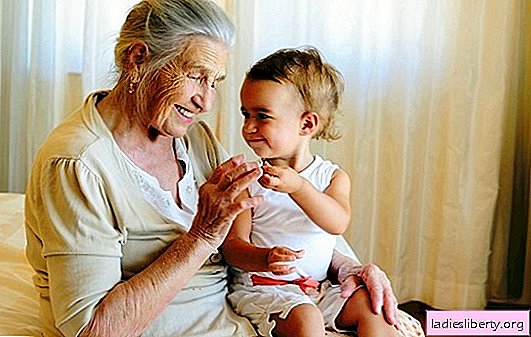
How long has your whole family been waiting for this moment, and now it has come! Finally you are at home, and your newborn baby is with you. Watching this real miracle of nature lying in a bed in a frog pose, you are trying to guess what can be expected from a baby at every moment of his life. The arms bent at the elbows, the legs spread apart to the sides - the whole body seems to have an increased tone. Do not worry - this is a normal reaction of the child - the desire to return to the usual intrauterine position. But what will happen next? Does he develop normally, how should he breathe, how often does he urinate and eat?
There are millions of questions. Let's try to follow the advice of doctors and experienced mothers. In the first month, the baby grows by 3 centimeters, and the weight can increase by 600 grams, and this taking into account the fact that in the first few days the baby loses 10% of body weight due to the restructuring of blood circulation, activation of the immune system, the beginning of the digestive system, kidneys and etc. At this time, the child sleeps almost all the time - up to 17-20 hours a day, often in short intervals. All babies sleep differently, some fall asleep right during feeding.
1 month baby development
Nature made sure that our children, acting on the basis of unconditioned reflexes, could survive, adapt to conditions, prepare for the development of non-reflex movements. In the first month of life, the child has a sucking reflex, with the help of which he receives nutrition. Try to draw a finger around the mouth - the baby will show sucking movements. When touching the cheek, he will turn the head, and when standing on his stomach, he will already be able to turn the head to ensure free air for breathing. By the month the baby can grab your finger, so tightly that it can even be lifted a little in this way.
If you place it vertically so that it touches the surface with your feet, the legs make several steps. The main thing is that he does not cross the legs, otherwise you need to consult a neurologist. Kids hardly hear a month, but with sudden ringing sounds they raise their arms and legs. If he reacts in this way to minor noise, this may mean increased excitability. The baby also confidently responds to pressure on the heel and palm, and lying on his stomach, makes swimming movements. In the first months, the child grows as fast compared to his weight as never before in his life.
1 month baby care
1. Of course, at this time his whole life depends on caring for the child. All his work is to suck milk, but he still does not know how to do it right, sucking in air with food. He seeks to get rid of it by spitting up, so that it is easier for the baby to cope with this, every 5-10 minutes when feeding, change the breasts or the position of the bottle every 50 grams. Set it upright and wait for regurgitation, then continue feeding.
2. Help the baby get rid of bloating, which affects all newborns to varying degrees. To do this, massage your palms clockwise. Another way is to put the tummy on the chest and stroke the back. During the day, you need to do such procedures several times. In more complex cases, dill water, a gas outlet tube are used.
3. Watch for the umbilical cord - it disappears between the first and second weeks. It is necessary to properly treat the umbilical wound so that it does not redden and swell.
4. Inspect the fontanelles - the gaps in the places of convergence of the cranial bones with the connecting membranes. They need to be washed during bathing, by 3 months it will take a little, and by 18 months it will be big.
5. Examine the boys while crying - no noticeable reactions should appear in the navel, scrotum or groin. Tumors, protrusions may indicate the presence of an umbilical hernia.
6. Perform a massage for 10 minutes to strengthen the baby’s muscles and stimulate his physical development, the time is half an hour after feeding. Outdoor walks are very important.
7. Particular attention should be paid to skin care, in the first months it is gentle and sensitive, in addition, it is exposed to urine and feces. You need to use soft materials and dry diapers, lubricate the skin with baby oil and powder.
8. Girls are washed from front to back, after each change of diaper or diaper. The boy needs to be washed as well, but every 10 days, wash the foreskin with plain water without soap. You need to bathe the kids daily.
Baby food in 1 month
Better nutrition than breast milk has not yet been invented by nature. It is able to fully cover all human needs for nutrients in the first six months. But if for some reason lactation is not established, you can successfully use adapted milk formulas. Mixed options are also possible when, with a lack of milk, a child can be fed with mixtures.
It is better to apply the baby breast more often to stimulate lactation. Today, in the diet, priority is given to free feeding, in other words, "feeding on demand", while the bulk of the milk is absorbed by the baby in the first 5-10 minutes of feeding. If the baby is not energetic and falls asleep during feeding, it is better to wake him and encourage him to suck, so that not only saturation, but also weight gain occurs.
1 month baby day regimen
The proper organization of the daily regimen is part of caring for the baby. Newborns live according to their special regimen - they want to eat every 2-3 hours and the rest of the time they almost always sleep. So their physiological needs require. At 1 month, the baby already needs help. At any time, the baby can be awake, and this is not always daytime. The regime may go astray if the child mixes up night and day, and then mom will have a hard time.
At the age of 1 month, the duration of sleep is 18-19 hours, wakefulness intervals from 30 minutes to 1.5 hours. It is advisable to feed the baby 7 times a day and from 19.00 to 6.00 already put the baby to sleep at night. During the six-time feeding, the sixth feeding already has a night's sleep. From the first days every morning you need to wash your baby, clean his ears and nose.
Lessons with a child in 1 month
For the development of the child, you can use bathing and conduct interesting exercises. If you bathe in the bathroom, you can take the baby with you and put it on the chest with the back of the head. Hold the tummy with your left hand, use your right to show rattles or water it. Connect dad. Roll your baby in the water, swaying up and down, just hold his chin and turn in different directions.
Let him push away from the side of the bathroom with heels, bring him closer to the edges so that he rests with his feet. A few springing movements will help the baby understand how to behave. Another exercise - hold the child upright so that he rests his feet on the bottom - let him step over - as if walking. Then turn it on the back - let it float. Exercise "rocking" perfectly strengthens and develops the vestibular apparatus.
Games and toys for children in 1 month
Of course, in the first month, the baby is not yet ready for games and entertainment, just talk to him with a voice with a different timbre, connect dad, tell the baby stories about how he was expected and how happy he was. Carry on your hands and iron parts of the body. The first toys are light rattles and a mobile suspended above the crib. The baby can be shown tweeters, shake rattles in front of the eyes with different intensities. Kids love music - dance with it, pressing it vertically - at the same time, gas prevention is carried out. Lean to him more often, let him examine your face, introduce him to family members and relatives.
Games and exercises: 1 month
When the child is awake, try to play with him and do some useful exercises. Stop classes if the baby cries.
1. In the position of the baby on his back, give him thumbs, and when he grasps them, part the arms and shake them slightly.
2. A good effect is given by drawing on the feet of the "eights" when swimming.
3. Stroke the baby on the forehead from the middle of the temporal lobes.
4. The simplest finger massage on handles and knives.
5. Stroking crumbs from chest to shoulders.
6. Stroke the foot from foot to hip, holding the heel with the other hand.
7. Gentle hand massage from the hand to the shoulder.
Kids perceive the melodic music of Mozart, Strauss, Haydn, Vivaldi well, while listening to the physiological processes of the child. Children also love to listen to a person’s voice, so talk to him as much as possible, change the intonation, greet, coming closer, and change the timbre of the voice.
1 month medical observation
Children all develop according to their program, but by the end of the first month they should master some common skills. In addition to caring for the fontanel and umbilical cord, medical supervision at this time consists in monitoring how the baby develops.
At 1 month, babies can already:
- raise the head lying on the tummy;
- blink and startle at sharp sounds;
- listen to the sounds, distinguish mom’s voice, turn the head to the sound;
- fix a look on the person inclined to it;
- with a smooth movement of the object to watch his eyes;
- make sounds "o", "a", "y";
- grab a finger or a rattle.
Useful Tips for Parents
In order for both the mother and the child to be in a good mood, the whole family must take care of a favorable condition, be calm and not show nervousness. It is better to carry the baby in his arms - so he will feel the beating of his mother’s or father’s heart, smell it - this calms him. It is very important to create tactile contact, monitor the temperature of the room, do massage and lay the child on the tummy.
Sing songs to him and tell proverbs and nursery rhymes - he will react to sounds and will soon try to enter into dialogue. He will begin to walk faster and meaningfully "agukat." Bright and contrasting toys develop vision and perception. As soon as he begins to focus his attention, move the toys so that he watches them in motion. Talking to him as often as possible and maintaining visual contact, you will soon notice that your baby is smiling at you.
Comments











